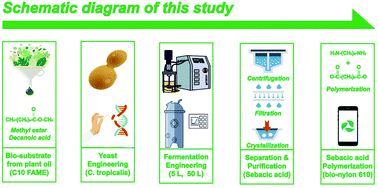Microbial production of sebacic acid from a renewable source: production, purification, and polymerization†
Abstract
Sebacic acid (SA) is an aliphatic ten-carbon dicarboxylic acid (1,10-decanedioic acid) with a variety of industrial applications, including the production of plasticizers, lubricants, cosmetics, and plastics. Currently, SA is produced exclusively from alkaline pyrolysis of castor oil. Herein, we present an environmentally friendly green route of SA production from plant oil-derived sources by microbial ω-oxidation. We genetically engineered β-oxidation-blocked diploid yeast Candida tropicalis, and created an effective microbial cell factory with an increase of 46% in SA production by overexpression of genes involved in ω-oxidation of hydrocarbons compared to the original strain. A biotransformation process of SA production from decanoic acid methyl ester was developed to overcome the challenges of high-density cell culture, substrate feed, substrate/intermediate toxicity, and foam generation. Fed-batch production of engineered C. tropicalis resulted in a molar yield of above 98%, a productivity of 0.57 g L−1 h−1, and a final titre of 98.3 g L−1 in a 5-litre fermenter and the results were successfully reproduced using a larger scale 50-litre fermenter. The produced SAs were successfully purified to >99.8% using acid precipitation and recrystallization. Finally, bio-nylon 610 was successfully synthesized by polymerization of the purified SA with hexamethylenediamine and showed thermal properties very similar to those of commercially available nylon 610. The processes developed and described in this study can be employed to produce and isolate SA for the synthesis of bio-nylons, using environmentally friendly procedures based on microbial biotransformation with potential industrial applications.



 Please wait while we load your content...
Please wait while we load your content...